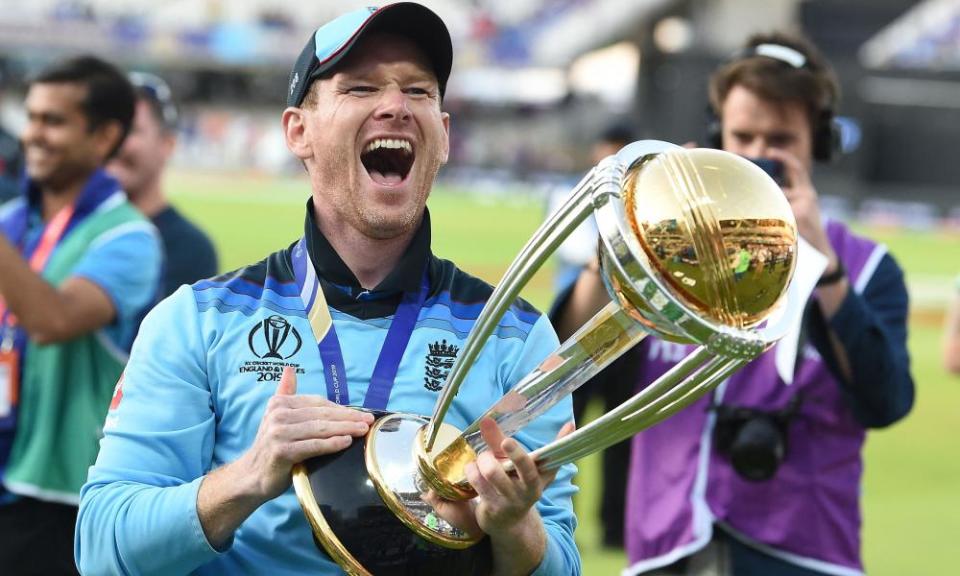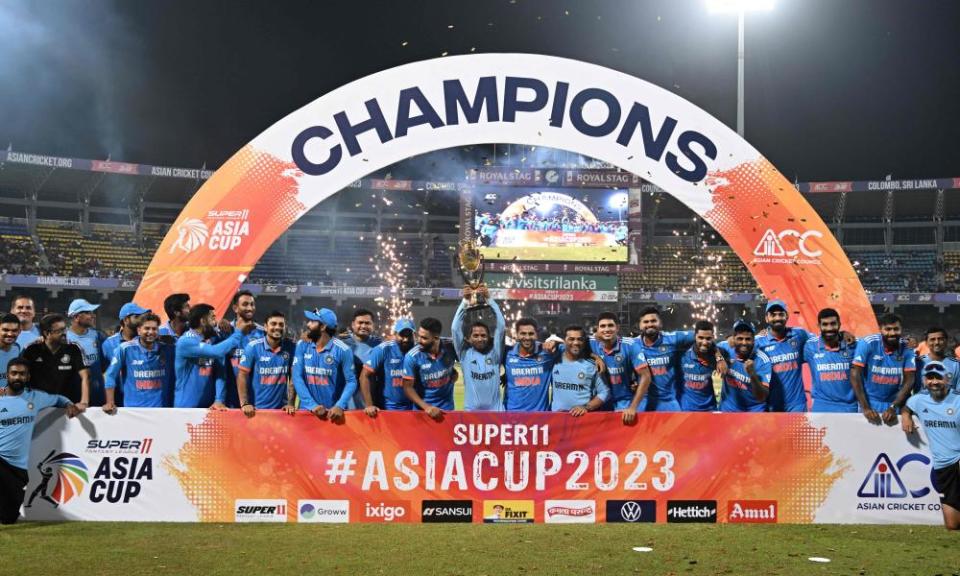
In a sport that is forever transmogrifying its global tournaments, there is a degree of familiarity about this impending Cricket World Cup in India. It has the same structure as in 2019: 10 teams, round-robin, four semi-finalists thrown up by this league structure. But there is also one change of note in the regulations. All games, not just the semi-finals and final, will have a super over should the scores be tied. And if that super over throws up a tie, an unlimited number of additional super overs will follow until an outright winner is produced.
This tweak represents a tacit admission by the International Cricket Council about the famous finish at Lord’s four years ago. Defending 15 runs in the super over, and seeing New Zealand equal this tally, England were crowned champions by virtue of hitting more boundaries in the match, but a good deal of criticism followed.
Related: ‘A born leader’: how Jos Buttler’s quiet authority made him England’s captain
“I’m not against [the change], I suppose everything is evolving,” says Eoin Morgan, the England captain that day before he heads out to India. “Anything that makes the game more progressive and equal.”
The follow-up question here is to ask if that means he thinks boundary countback was unfair on New Zealand; whether this particular tie-breaker for the tie-breaker, designed for the quick-fire Twenty20 format and unthinkingly transferred across to the 50-over World Cup, should have settled such a gargantuan final.
“Given the fact over the four years [leading into the 2019 World Cup] we’d scored more runs and hit more runs and more fours and sixes than any other team, that doesn’t bother me,” he says. “If we’d been a team that nudged and nurdled it, I might feel differently.”

It is a typical steely answer from Morgan, who, after hanging up his bat last year and handing the captaincy reins to Jos Buttler, has moved into the Sky Sports commentary box and will be among their team of analysts over the next seven weeks.
Morgan, unsurprisingly, is optimistic about England’s chances. He notes additional challenges Buttler has faced as his successor but is happy these have been tackled with “authenticity” rather than emulating his own style. He is also envious of the side’s depth.
“The 2019 World Cup was always the target,” he says. “We played without pressure to lift silverware until then whereas Jos has had to plan for this World Cup and T20 World Cups either side. Test cricket is also now the out-and-out priority as opposed to when I was captain and it was equal.
“But on the plus side, the strength in depth is now at a completely different level. I do think we could genuinely put out two teams that could contend for semi-final positions; and one that could go on to win.
“Outside of the possible playing XI, the spare batters and bowlers are all stronger in experience and skill level than guys who didn’t play a huge part in 2019 – that’s nothing against them, it’s just that we’re further along and better.”
Related: Australia Cricket World Cup 2023 squad: Travis Head and Marnus Labuschagne make team with Ashton Agar out
For all this confidence, Morgan sees another as favourite. Like many, India are his team to beat. That semi-final defeat to New Zealand in Manchester four years ago still gnaws away in the country but now, as hosts and recent Asia Cup winners, they certainly look the part.
“Even before the Asia Cup you’d say they’re favourites,” says Morgan, of the No 1-ranked side. “And even before Jasprit Bumrah came back from injury. They’ve gathered good momentum leading into the tournament; it has been a smoother buildup than for the other top teams. Their biggest challenges are picking their best XI, whether they go with more spinners or all-rounders. The second is how they handle the pressure that comes with being favourites at home.
“But that is something I think they can do. They did it in 2011 and a player like Virat Kolhi has been through that as a younger man. They will have talked in depth about what might come up if they do lose a couple of games in the group stage. So yeah, they’re very strong.”

Zooming out a bit, there is the question of the World Cup’s future in an era where Twenty20 cricket is taking over the landscape and bilateral ODIs have lost their lustre. “Between now and 2027, it wouldn’t bother me if you didn’t play much ODI cricket until the actual year of the World Cup,” says Morgan. “The one advantage 50-over cricket has is the 10-team World Cup – it is excellent cricket to watch but also a massive revenue stream for the ICC and the world game. But I think [the bilateral landscape] might look different between now and 2027 and that could be a good thing.”
The showpiece tournament will certainly live on for the foreseeable: the ICC’s $3bn broadcast deal for India features another World Cup in 2027 in southern Africa before its end, with further contracts – such as Sky’s £260m eight-year agreement for the UK – running until 2031, when India will again be hosts along with Bangladesh. After that, who is to say.
Would Morgan shed a tear if Twenty20 eventually took over completely, bringing an end to the format that secured his legacy four years ago? “No, not at all,” comes the reply. “I’m far from the view that you should protect everything just because it’s been around a long time or has a special place in your heart individually. You have to move with every generation and foresee what is best for the game.”
Article courtesy of
Source link